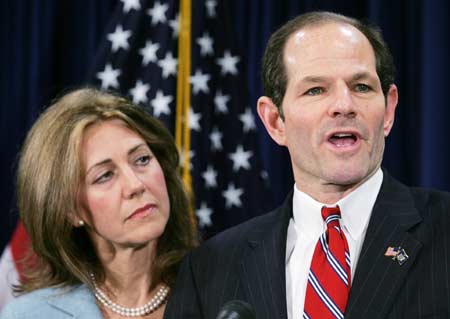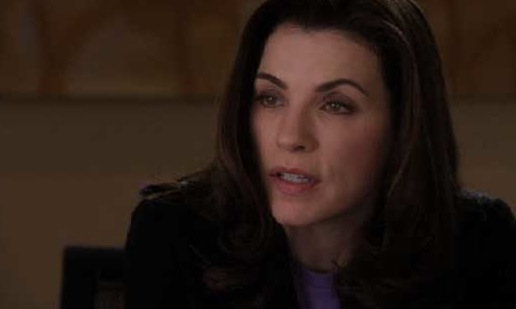Close Encounters
‘The Good Wife’: Headlines, Heroines, and Love Surviving Law
by Laura FissingerI'm finishing this article on New Year's Day, which makes me grin. One of the best broadcast television dramas to show up in ages was launched in 2009 by CBS. For me, it's New Year's good news: The Good Wife is definitely going to return in 2010 to finish its first season and do its second.
Hey, CBS, count your lucky headlines. One: The ratings started strong and grew stronger; according to the Nielsens, The Good Wife ended 2009 as the number 10 primetime program for the entire year. Two: Even the most polysyllabic critics mostly encouraged and applauded. Three: The drama is nominated for some nice prizes, including two from the Screen Actor's Guild (Ensemble Cast in a Drama Series plus Outstanding Female Actress Performance, from lead Julianna Margulies), one from the Writers Guild (Best New Drama), and a Golden Globe (again, for Margulies as Actor in a TV Series).
It's hard enough to find success with freshman series of any kind, much less hour-long dramas. It made sense to be wary of The Good Wife (CBS-TV) before the pilot even aired last September. Personally, I had both eyebrows raised.
When a television drama builds its central narrative on a "ripped from the headlines" shocker, too often it seems to postpone telling well-built stories with believable characters.
Recent years have showcased plenty of "good wives" on news broadcasts, women whose husbands have been caught in scandals of their own making—sexual, professional, legal, or all three. The wife is photographed at the spouse's confessional press conference, or driving out of the home driveway, or wherever media manages to get to her. Even those real life wives seem, at moments, too composed to be real.
Roots of The Good Wife: Silda Wall Spitzer stands by her manHarvard-educated lawyer Silda Wall Spitzer became a kind of heroine to millions when her husband, then-New York governor Eliot Spitzer, was caught in an ongoing pattern of hiring expensive prostitutes. It's difficult to forget the TV and newspaper images of Silda standing next to her spouse at his tell-all press conference.
For a while Mr. Spitzer was in danger of doing prison time. His spouse protected her children and herself with dignified silence and action, working at a charity she founded long before Mr. Spitzer brought his world down on his family like confetti made of shattered glass.
I was one of the millions in awe of Silda Spitzer, wondering how she was putting one foot in front of the other behind the privacy she fought so hard to maintain. With me among those riveted millions: writers/show creators (and producers as well, along with filmmaking brothers Tony and Ridley Scott) Robert and Michelle King. They penned the pilot episode for The Good Wife, inspired in part by Mrs. Spitzer. Also watching, brimming with questions: Emmy-winning actress Julianna Margulies.
In The Good Wife, the prostitution scandal and law-breaking of Illinois state attorney Peter Florrick do incomprehensible damage to the reality of Alicia Florrick, played by former E.R super-talent Margulies. The first handful of episodes was responsible for rooting the premise in viewers' heads. The title scenes and opening vignettes featured grainy "newspaper" shots, plus a sequence in which Alicia power-slaps her husband backstage after their disclosure press conference. Apparently we're way off if we worry for this good wife.
With husband Peter (Chris Noth, utterly believable) in prison, waiting for his trial, Florrick restarts her law career six months later. After 13 years at home, taking care of Peter and their two children, she knows those kids need her more than ever. Fourteen-year-old Zach (Graham Phillips) and 13-year-old Grace (Makenzie Vega) are turning into willful—and traumatized—teenagers. But money forces Alicia back to work; so does a bottomless need to rescue a sense of self. Alicia Florrick, defense attorney, lands a junior partnership at a top Chicago law firm.
That last part seemed like a stretch to me. Alicia getting hired by a prestige company after such a long workforce absence—it smells like lazy TV plotting. The writers of The Good Wife, however, don't do lazy plotting. (Yes, I'm applauding.)
Julianna Margulies as Alicia Florrick: Apparently we're way off if we worry for this good wife.The firm only hires her for flimsy reasons like her law-school and work history with partner Will Gardner (Josh Charles); the plan is to let her compete with other junior partners and see if she can save her own professional backside.
For as hard as sundry non-supporters try to make Mrs. Florrick's career rebirth, Alicia startles co-workers and bosses with an against-bad-odds victory in her first case. This fight to secure her job runs through plot points from week to week, but Alicia keeps doing noteworthy work, wearing down the firm's resistance to her in every episode. She doesn't necessarily win, or win without hurting others, yet she's back on the success track.
Here's the plotting architecture that proves so durable and adaptive for The Good Wife: The cases Mrs. Florrick is assigned to are wrapped up at the end of each episode. On that end, the show is a procedural.
The ongoing stories, by contrast, nearly turn the drama into a serial. Plus, those stories become increasingly complex every time they're featured. More applause to the show's writing team here: they manage to make sure that the procedural-style elements have some bonafide effect on the ongoing plots. No wonder the show's ratings keep climbing.
One of the long-range stories chronicles Alicia's painful ambivalence about Peter and, paradoxically, their surprisingly powered love for each other. Another story centers on her professional-life wars with assorted enemies—some of whom might be enemies of Peter's as well. These two story lines keep moving, as does the tale of Mom's knotted-up relationships with her smart, shell-shocked adolescents.
The necessity of working forces another battle of wills into Florrick's life—Peter's mother Jackie (Mary Alice Pell) stays with the kids during Alicia's very long days and evenings at work. By the November episodes (at press time, episode eleven is due next), we see the children plus Grandmother unwittingly becoming involved with the people trying to collapse Peter Florrick's world for good.
The battle being waged by Peter's numerous foes only comes into sharp focus when Alicia wins freedom for one of her firm's senior partners. He resigns at the episode's end. During his last conversation with Alicia, he spells out for us what we've been led to suspect over the weeks: "Peter was set up," he tells her. "He'll never get out of prison."
Without saying a word, Alicia makes her decision. Through Margulies' mastery of body language, we can hear the character thinking, "Oh yes he will get out of prison."
Game on. As Margulies has told the press herself, Alicia truly loves her husband.
The Good Wife: Season 1 finaleThat moment in the senior partner's office probably wouldn't work without someone as gifted as Margulies building Alicia's emotional dimensions. She also knows how to aim for the intersection of intensity and understatement, especially in her physical expression of this character.
Like her top-tier peers on the big screen, Margulies is a master of subtlety. I still remember the first moment that the E.R cameras found Margulies' face; without moving, it appeared, the actress made me feel spooked, drawn in, scared for her character. We found out later that Nurse Carol Hathaway was coming back after a suicide attempt.
Margulies has even more command over her face and body now. She's also getting small but delectable chances to exhibit Alicia's humor, and her own. Robert King is on the record promising us that more of those chances for levity are on their way.
Margulies got very lucky with co-stars for this series. She and Chris Noth create authentic chemistry and deep history for Alicia and Peter. At work, in-house investigator Kalinda (played by the charismatic Archie Panjabi) is evolving into Alicia's indispensable professional ally and that rare gift, a trustworthy friend.
Alicia dearly needed someone in her life to trust; the viewers needed someone to believe besides Alicia. Now that we know Peter's been set up and the conspiracy is in active pursuit mode, everybody seems like a possible part of it, by accident or on purpose. Clearly, though, Kalinda is not in that mix.
Somewhere pretty early in this series, the creative team behind The Good Wife made me forget about its link to Silda Wall Spitzer and all the women living through similar public scenarios. Alicia Florrick became fascinating on her own fictional merits. She and her world have grown into something worth an hour of my time every week.
Alicia Florrick might well be worth an hour of yours, too. I can't argue the case for The Good Wife any more persuasively than that.
The Good Wife airs on Tuesday at 10 p.m. eastern on CBS. View full episodes and highlights of The Good Wife at http://www.cbs.com/primetime/the_good_wife/
Founder/Publisher/Editor: David McGee
Contributing Editors: Billy Altman, Laura Fissinger, Christopher Hill, Derk Richardson
Logo Design: John Mendelsohn (www.johnmendelsohn.com)
Website Design: Kieran McGee (www.kieranmcgee.com)
Staff Photographers: Audrey Harrod (Louisville, KY; www.flickr.com/audreyharrod), Alicia Zappier (New York)
E-mail: thebluegrassspecial@gmail.com
Mailing Address: David McGee, 201 W. 85 St.—5B, New York, NY 10024



